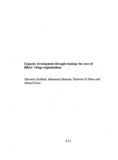| dc.contributor.author | Mahbub, Sharmin | |
| dc.contributor.author | Mannan, Manzurul | |
| dc.contributor.author | Khan, Shahriar R | |
| dc.contributor.author | Rana, Masud | |
| dc.date.accessioned | 2019-12-11T09:15:11Z | |
| dc.date.available | 2019-12-11T09:15:11Z | |
| dc.date.issued | 1996 | |
| dc.identifier.citation | Mahbub, S., Mannan, M., & Khan, S. R. (1996). Capacity development through training: the case of BRAC village organizations. Research Reports (1996): Social Studies, Vol – XIII, 111–124. | en_US |
| dc.identifier.uri | http://hdl.handle.net/10361/13251 | |
| dc.description.abstract | Capacity development through skill training is an important component of BRAC' s credit
programme. This study looked at the impact of capacity development of BRAC beneficiaries
on their performance as village organization (VO) members as well as use of the skill gained.
Qualitative data were collected from 3 VOs of south Uddamdi village of Matlab thana where
BRAC started working since early 1992. During analysis comparison was made between
members who received training and members who did not receive any training.
Results indicate that 27-39% of the VO members chosen for BRAC training were largely
selected by VO management committee in consultation with PA and PO. Sometimes a
member received training up to 5 times on different topics but did not use more than two.
There are large number of non-target group (NTG) members present in these VOs (on
average 27%) who influence the selection process. About 83% of the trainees were
above the age of 40 years. Also, VO management committee members and small group
leaders appeared to be more likely to be selected for training. Statistically significant effect
of skill training on savings/credit performance was noted. Group members who received
various inputs for capacity development such as training; .credit and employment
opportunities were better-off socially and economically than those who did not get this
opportunity. While looking for regularity of attendance, it was seen that members who
received training were more regular in weekly meetings than those who did not receive
any training. Problems in using training knowledge were lack of opportunities and support
from fellow group members as well as staff Operational problems associated with training
include ,inducing false hope and inadequate supplies of training materials. .
Members perception about training was initially not favorable but later when the benefits
started showing, their interest increased. The study shows that members perceive the VO
as a mechanism through which they may receive services and inputs from BRAC and they
exert pressure on BRAC staff to provide ~hem with these inputs. This sometimes stress
the relationship between the members and staff. However, VO members and BRAC staff
pursue for increased interdependency to, protect the interest of VOs. · | en_US |
| dc.language.iso | en | en_US |
| dc.publisher | BRAC Research and Evaluation Division (RED) | en_US |
| dc.subject | Capacity development | en_US |
| dc.subject | Training | en_US |
| dc.subject | BRAC village organizations | en_US |
| dc.subject | BRAC | en_US |
| dc.subject.lcsh | Rural development--Bangladesh--Matlab. | |
| dc.subject.lcsh | Non-governmental organizations -- Bangladesh. | |
| dc.title | Capacity development through training: the case of BRAC village organizations | en_US |
| dc.type | Research report | en_US |

